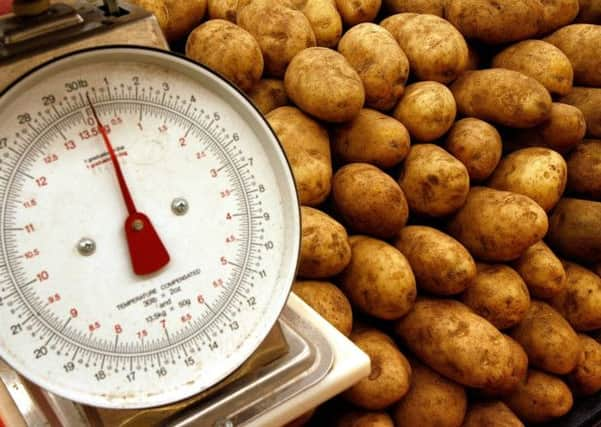Science crucial in potato crop defence


A consortium of British scientists was able to boost resistance of potato to its most important threat, the pathogen Phytophthora infestans – which in the 1840s triggered a famine that resulted in the death of one million people in Ireland.
Thankfully global farming systems today, at least in the developed world, are much more robust and such a situation is unlikely to reoccur. Growers and farmers have an array of tools and modern techniques at their disposal to help them in their fight against crop pests and diseases. This, and the development of sustainable production systems and farming practices, is the focus of considerable research at the James Hutton Institute.
Advertisement
Hide AdAdvertisement
Hide AdOne of the tools available to farmers and growers is the use of pesticides and fungicides. Alcohol and caffeine, when used to excess, are highly dangerous chemicals yet many of us enjoy consuming them in moderation. Similarly, when in pain we reach for medicines such as paracetamol even though we know that taking too much can be lethal. We use these chemicals because we weigh up the risks against the potential benefits.
It seems paradoxical, therefore, that the European Union has put legislation in place that will result in the banning of many pesticides based on their potential hazard when used in excess rather than on their risk when used at recommended levels.
On the face of it this seems like a sensible, environmentally friendly option except that much of our crop production relies on such chemicals. With their withdrawal, marketable crop yields within the EU are likely to go down as waste associated with diseased crops increases, estimated at 15 per cent today, potentially towards global levels of nearer 40 per cent. In an extreme example, it was estimated in a study commissioned by the GB’s Potato Council that, in the absence of fungicides to treat late blight, potato crop losses in the UK could reach 55 per cent of total production, equivalent to £363 million.
Such a situation reminds us of the precarious position that people found themselves in during the Irish potato famine, when the absence of crop protection products led to mass food shortages and emigration on an epic scale. Fortunately such total crop failures are a thing of the past, but we still need to ensure that food production is protected especially if we aim to produce more of our own food rather than importing over 40 per cent of the food that is consumed in the UK today.
So what are the solutions? The first one seems obvious – we need to ensure that we take a sensible approach to the use and future production of pesticides and fungicides, assessing all the risks associated with their use rather than basing this use on hazard alone.
Secondly we need to put more emphasis on the development of resistant crop varieties, as we do at the James Hutton Institute. The use of modern molecular plant science is already leading rapidly to the development of crop varieties with more durable resistance.
However, in order to use these scientific advances to their best effect we should also keep an open mind to the use of biotechnology and the benefits that GM crops can offer.
Finally, and most sensibly, we need to ensure that we use the whole range of crop protection methods that are available to us in the best way that we can as part of an integrated pest management approach.
Advertisement
Hide AdAdvertisement
Hide AdIntegrated pest management is a broad-based approach that combines different crop protection methods, encouraging natural methods where possible, to maximise crop production while ensuring the least impact on the agricultural system, the environment and human health. Using science to protect crops from pests and diseases will ensure sustainable increases in food production whilst protecting ourselves and our environment long into the future.
• Professor Ian Toth is Theme Leader for Controlling Weeds, Pests and Diseases Research at the James Hutton Institute. To find out more about our research on integrated pest management, visit www.hutton.ac.uk/ipm